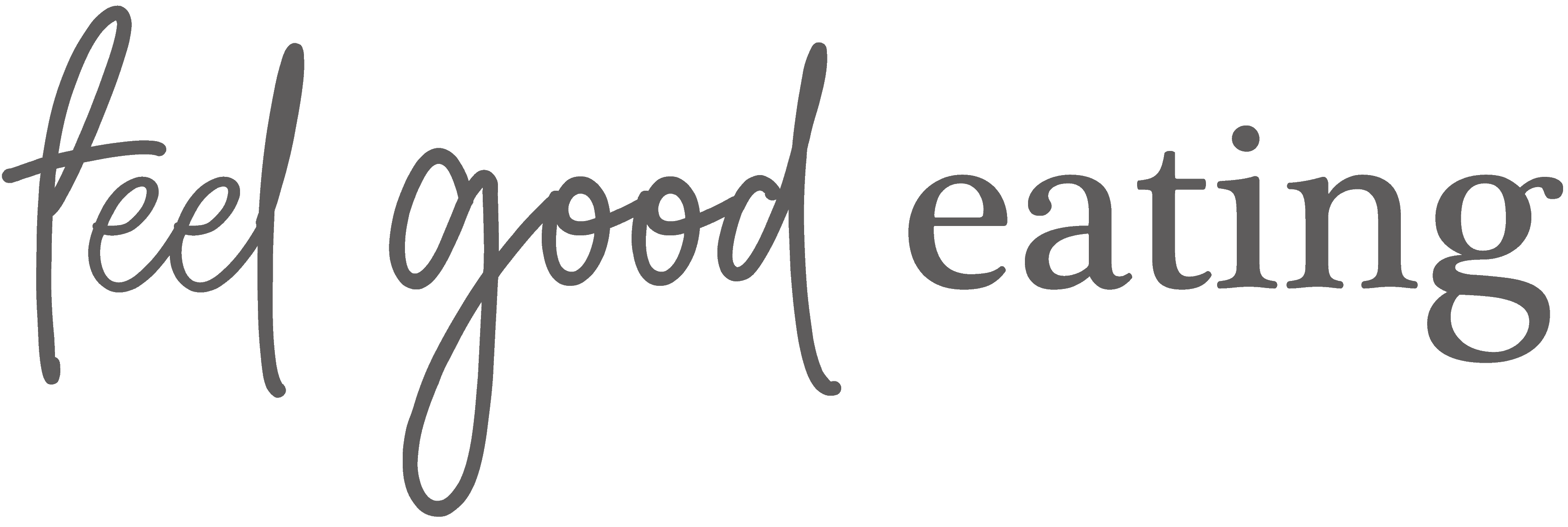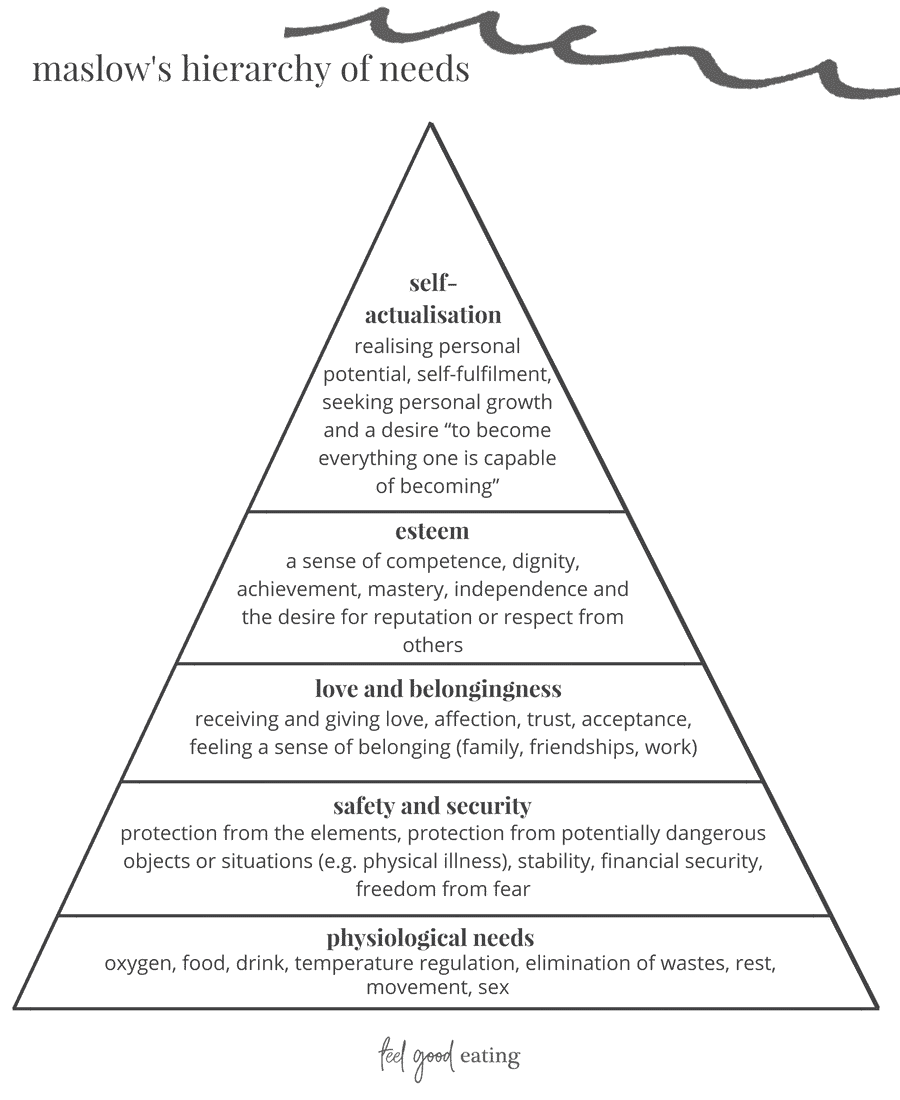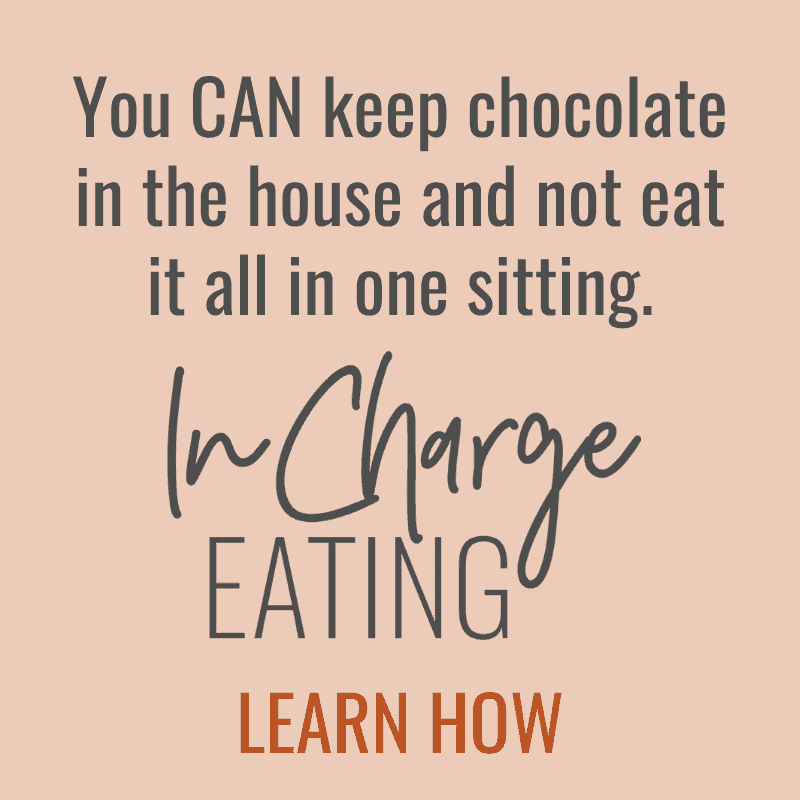I am thrilled to bring you this guest post from Dr Jacqueline Baulch on simplifying self-care. Join me in welcoming Jacqueline to feel good eating!
As a psychologist, I’m in the business of self-care. I’m drawn to books, blogs, podcasts and videos about the topic. I’m an (over)enthusiastic attendee of workshops and courses and I’m surrounded by colleagues who routinely weave self-care into the conversation. In short, I’ve spent hours on the whole “self-care thing” and yet sometimes I find there’s a block for me. There’s a gap between me planning to take care of myself and me actually doing it.
Recently I’ve realised that one of my biggest barriers to practising self-care has been overcomplicating the process.
A turning point for me has been getting clearer on what I mean when I say “self-care”. Put simply I’ve come to think of self-care as taking care of my needs (sounds obvious right?!). As humans, our needs come in many shapes and forms, but I particularly like the way Abraham Maslow, a well-known American Psychologist, categorises our needs into a hierarchy that goes like this:
Maslow’s theory was that until our basic physiological needs are met, we’re unable to (and perhaps should not) focus on higher level, more complex needs like love and belonging, developing our self-esteem, pursuing learning and appreciating the beauty around us.
Feeding ourselves, resting, taking toilet breaks, getting fresh air, moving our bodies, touch – all of these are basic human needs. When we ignore these needs and skip to the next rung of the pyramid, our foundation becomes shaky. When our foundation becomes shaky, of course, we risk the whole pyramid coming tumbling down.
Ever struggled to meet a deadline (a higher level cognitive need) without enough sleep under your belt (lower level physiological need)? Or wondered why it’s hard to muster up the energy to have a decent chat with a friend (higher level love and belongingness need) when you haven’t eaten enough food (lower level physiological need)? Or kept putting other people’s needs before your own, only to wind up feeling completely overwhelmed and run down yourself? That’s this pyramid in action.
Why is this relevant to self-care?
Well, sometimes when I most need self-care, one of my main barriers to actually taking care of myself is figuring out what I actually need in that moment. This hierarchy guides me. This hierarchy also reminds me to start with the simplest option first (an excellent solution to my tendency to overcomplicate and overanalyse things!).
When I know I need to slow down and take care of myself, rather than jumping to some sort of complex strategy or solution to how I’m feeling, I first ask myself “what do I need right now”?
I’d encourage you to have a go at asking yourself this question next time you notice you might need some self-care. It’s a powerful question and you might be surprised by how easily you’re actually able to say what you need.
If you wake up feeling a bit off-colour, try asking yourself “what do I need right now”?…
If you notice yourself getting carried away by worries, try asking yourself “what do I need right now”?…
If you find yourself feeling unsettled after you spending time with someone, ask yourself “what do I need right now?”…
If you’re not sure, get specific and actually ask yourself:
- Do I need to eat?
- Do I need to drink?
- Do I need coffee (perhaps not one of Maslow’s official questions, but an important one nonetheless)?
- Do I need some quiet time?
- Do I need to sleep?
- Do I need to stretch or move my body?
- Do I need a hug, a massage or some other comforting touch?
- Do I need to cool myself down or warm myself up?
- Do I need fresh air?
- Do I need to tune into my breathing?
And I would add to this list – do I need to pee?! Perhaps I shouldn’t admit this, but sometimes I get so caught up in what I’m doing, I actually delay going to the toilet until I’m busting. My office mates see me rocking around in my desk chair and wonder what’s going on! I would never make someone I cared about wait to pee while I sent an email, so I shouldn’t be doing this to myself!
Have trouble putting yourself first when it comes to self-care?
If you still feel stuck with your own self-care or have trouble putting yourself first, ask yourself, what would I do to take care of someone I cared about right now?
Often we know exactly how we would help someone else when they need a little love and attention, but we can sometimes draw a blank when it comes to ourselves. Would you like a cuppa? Can I give you a hug? Here, I’ve made you some dinner. Let me pick you up from work. How about we go for a walk around the park together? Simple things, that make all the difference.
Tuning into my needs from moment to moment was challenging at first, but the longer I’ve been doing it, the more I am surprised by how my mind and body intuitively knows what it needs. I just had to get into the habit of asking.
My client’s experiences, as well as my own, have shown me that self-care is not as simple as it sounds, even if you’re just focusing on the basics like I’ve suggested above. Self-care can be challenging for a whole variety of reasons, many of them stemming from childhood experiences and beliefs about what it means to slow down and deliberately take time to care for yourself. Of course, our life situation can also make self-care difficult – parenting or caring for someone are obvious examples here, but there are others too. If you find yourself getting stuck when it comes to caring for yourself, you might find it useful to speak with one of our psychologists to understand a bit more about some of the barriers that might be getting in your way.
share your tips for simplifying self-care in the comments below
Meet Dr Jacqueline Baulch
Jacqueline is a clinical psychologist and the Director of Inner Melbourne Clinical Psychology. She has eleven years of experience working with a wide range of mental health issues in both private and public settings. She is inspired by the resilience and courage of her clients and truly believes in the value of therapy not only for improving mental health but also for creating a more fulfilling and meaningful life. Jacqueline is passionate about shifting the “hush-hush” atmosphere surrounding mental illness, emotions and vulnerability. She believes honest and real conversations can spark hope and healing, and help us to feel less alone in this messy business of being human.
There’s lots of useful information, tips and food for thought on the Inner Melbourn Clinical Psychology website blog and via their Instagram and Facebook pages. You can also download the free mindfulness exercises and eBook Find Your Calm During the Storm: A Guide to Managing Stress.
References
- Maslow’s Heirarch of Needs adapted from Maslow, A. H. (1943). A theory of human motivation. Psychological Review, 50(4), 370-396.



 Hi! My name is Nina.
I’m a Certified Intuitive Eating Counsellor taking the ‘diet’ out of Dietitian. I am here to help you reject diet culture, tune into your body’s own inner wisdom about how to truly nourish yourself and ultimately feel good eating™
Hi! My name is Nina.
I’m a Certified Intuitive Eating Counsellor taking the ‘diet’ out of Dietitian. I am here to help you reject diet culture, tune into your body’s own inner wisdom about how to truly nourish yourself and ultimately feel good eating™ 

That hierarchy of needs really puts things in perspective – well done post!
Thanks so much Ginger – it is really helpful to visualise isn’t it?
I have serious trouble with self care. I spend my days taking care of others and don’t have much time to take care of myself. I can see the toll that it is taking, but it’s still a hard thing to change, but I’ve recently started trying to do it more.
Such a hard thing to change – especially if you feel like you are giving up on others you care about in the process. I hope the last section of the article helped. You are worth caring for 🙂
Love this post! And I totally forget to pee when I get caught up in what I’m doing. Studying yoga and working on mindfulness has helped me, but when my creative or go-go side takes over, things sometimes get out of balance!
I know what you mean! When you get in your flow, it is like the rest of the world disappears.
Love this – it’s a great reminder that you need to take care of yourself first before you can take care of others!
So true
I also think we can over-complicate what self-care “should” look like, so this was the perfect reminder to ask ourselves what WE really need!
Yesssss love this Kara. Self-care isn’t another thing we have get perfectly right.